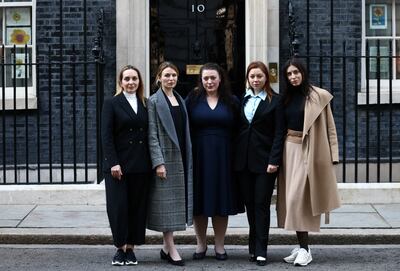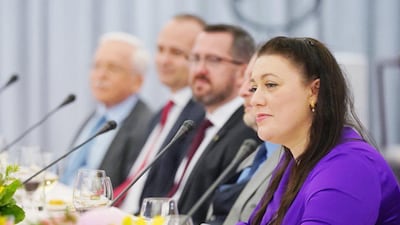Britain’s decision to scrap its full-time Middle East minister has been condemned as “ridiculous” and the post should be fully reinstated, Parliament’s foreign affairs committee chief has told The National.
Alicia Kearns argued that the UK’s strategic decision for a “Pacific tilt” meant that it had taken its focus off the region at a crucial time, scrapping the position just before Russia invaded Ukraine in February.
The MP also criticised the former prime minister Liz Truss for backing a proposal to move Britain’s embassy in Israel to Jerusalem adding “she just wasn’t interested” in Middle East affairs.
Ms Kearns further urged western powers to directly target Iran’s supply of weapons to Russia that are killing Ukrainian citizens.
Britain's foreign policy also had to prioritise the areas where it wanted influence or support as “we cannot be everywhere, helping with everything”.
The foreign affairs committee is seen as influential on UK policy but Ms Kearns, who was elected chairwoman in October, undertook to reform procedures to make it more incisive “like a think tank” and minsters more accountable for its recommendations.
In a wide-ranging interview, she touched on Afghanistan’s growing narcotics threat and her worries of nuclear war over Crimea.
Missing minister
There remains dismay in political circles over London’s continued decision to not to reinstate the Middle East and North Africa minister, instead dividing it up between politicians.
Lord Tariq Ahmad undertakes an unpaid role covering the Middle East and North Africa, as well as south Asia and the UN, while MP Andrew Mitchell covers Africa and overseas aid.
When there was a designated Middle East minister this brought Britain greater access and influence, Ms Kearns said, particularly in the Gulf States which had become increasingly important with the growing energy crisis.
“The current division of work between ministers is frankly a bit ridiculous,” she told The National. “It’s not the most well thought out division of portfolios and we should without question reinstate the Middle East minister.”
She also argued that Britain’s much lauded “Pacific tilt” in its Integrated Review on defence on foreign policy also suggested a “tilt away from the Middle East”.
“We cannot afford to do this in terms of our direct influence, our interests on migration, drugs from Syria, our responsibilities and the place that we have strong relationships with.
“There are big problems in the Middle East but just because it's uncomfortable and difficult and there are no PR wins doesn't mean you can tilt away from the region.”
Jerusalem and Truss
Although her premiership lasted 50 days, Liz Truss did manage to cause alarm across the Middle East after she backed Israel’s long-held ambition to have Britain move its embassy from Tel Aviv to Jerusalem.
The proposal was labelled an “illegal action” under UN rulings and was quietly dropped after Rishi Sunak became prime minister. “I’m very pleased as the vast majority of parliamentarians did not want the embassy move to happen,” Ms Kearns said.
“I think there's a real challenge here, which is that under Liz Truss all focus on the Middle East — including the Gulf — just was off the agenda. She wasn't interested in it. It was complicated, thorny, sensitive,” she said.
“But we are very entrenched in our defence relationships with the Gulf countries and they play key roles as interlocutors.”

Follow the drones
With no nuclear deal in sight, internal strife and its continued supply of kamikaze drones to Russia, the MP accused the international community of being “frozen” and “paralysed by an absence of ideas” on Iran.
The nuclear deal was “failing if not dead” and Iran was behind a massive drug smuggling operation in Syria that “will hit British shores at some point”, she said, as well as the “brutalisation of women”.
“But I have not been able to identify a single meaningful international effort to move things forward.”
She labelled Iran’s supply of at least 500 Shahed 136 drones to Russia as “completely heinous” for killing civilians, that “makes them a combatant in the war”.
The West should be “interrupting the flow of drones” by actions such as publicising arms airlifts on flight maps.
“We should genuinely be intervening to stop these flights,” she said. “But what worries me is there’s such an absence of ideas on Iran.”
Nuclear Crimea
The fear that a Ukraine assault on Crimea might make President Vladimir Putin reach for the nuclear button is “the nightmare when I sit up at night worrying about what's going to happen next”.
While Ukraine has vowed to retake all parts of the country seized by Russia since 2014, Crimea is more sensitive because of its historical links to Moscow.
The difficulty was that there had been no public discussion over any attempt to liberate Crimea, the MP said.
“They have every right to fight to take back Crimea but the reality is that we know for Putin, Crimea is the closest you could come to a red button-pressing situation. So is there a point at which the West has to intervene and say we cannot tell you what to do, however, going for Crimea really is the nuclear option in terms of what you might want to be pursuing.”

UK everywhere
With limited economic resources and a huge focus on Ukraine, Britain also had to recognise that “we cannot be as deep as we want to be in many countries at the moment”.
“Covid and Russia’s illegal invasion has brought into question our ability to be everywhere at once and this has been a problem in foreign policy for a long time in the UK.
“Therefore, we need to turn to those who might be able to pick up in other places as we cannot be everywhere, helping with everything.”
She added that some politicians believed that unless Britain was involved in resolving “every single war and humanitarian crisis” it had no moral leadership.
Instead it had to work with allies such as the Gulf States, highlighting the role they played in hostage negotiations with Russia to free western prisoners.
Ignoring Afghanistan
She condemned western powers for failing to assist the Afghan resistance currently battling the Taliban under the leadership of the National Resistance Front.
“What does that say about international friendship? If we want to reassert ourselves in the world with middle countries we should be helping and standing by those who stood by us.”
Her concern was that the main conversation about Afghanistan was over human and women’s rights which was “absolutely correct” but “we should also be talking about counterterrorism and threat the Taliban’s foreign fighters’ pose”.
Think tank
As chairwoman, she has the power to shape the direction of her committee’s investigations and Ms Kearns announced two fundamental changes on how it would operate.
“I'm really trying to shift how we work,” she said. “I want us to operate more like a think tank, so proffering solutions and flagging up where the government isn't looking at foreign policy that it should be.”
This would help Parliament “shape things” and Downing Street to “challenge civil servant groupthink”.
“Rather than having just the ideas coming from the civil service, we're saying, here's some ideas you might not have thought of.”
She also pledged to hold ministers to account by recalling them to hearings to see if they had implemented recommendations from its reports.
“No select committee chair has ever called in the government a year later, asking ‘you said you're going to do five recommendations? Did you do it? Where's the proof? Did it work?’
“You can't say a year was too long to introduce our recommendation.”


